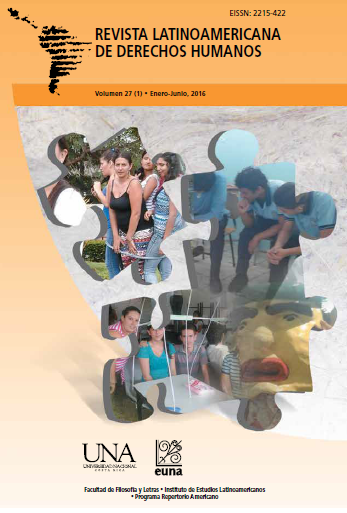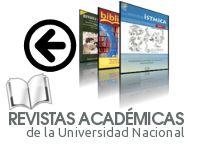Analysis of the concepts of reconstruction, resolution and reconciliation from the postulates of the TRANSCEND Research School for peace
DOI:
https://doi.org/10.15359/rldh.27-1.2Keywords:
Reconciliation, social conflict, Armenian Genocide, victim, perpetrator.Abstract
This article aims to analyze the Theory of Reconciliation proposed by the TRANSCEND School of Peace Research. A preliminary approach to the topic allows to suggest the following question: Which is object of reconciliation? The answer to this question will allow the conceptualization of reconciliation as a dispute intervention process who promotes dialogue and peace building with respect to those social relations where there has been an episode of violence and the relationship between the parties has broken, reaching diverse dimensions of social conflict (micro, meso, macro, mega and meta levels).
Finally, it will be exposed how reconciliation allows to demonstrate that social relations are dynamic, flexible and sensitive to the variables of time, space and place, as well as the conflicts. This leads to affirm that every controversy that has escalated to the point of generating violence causing a rupture in the relationship can also become peaceful; this refers to the hopeful vision of reconciliation.
References
Abel, R., Felstiner, W. and Sarat, A. (1980-1981). The Emergence and Transformation of Disputes: Naming, Blaming, Claiming …Law & Society Review: Special Issue on Dispute Processing and Civil Litigation, 15 (3/4), 631-654. http://dx.doi.org/10.2307/3053505
Arendt, H. (2013). Eichmann en Jerusalén. Barcelona: Random House Mondadori S.A.
Culbertson, H., Lederach, J. P. y Neufeldt, R. (2007). Reflective Peacebuilding. A Planning, Monitoring and Learning Toolkit. Mindanao: The Joan B. Kroc Institute for International Peace Studies, University of Notre Dame and Catholic Relief Services Southeast, East Asia Regional Office.
Dadrian, V. (2008). Historia del Genocidio Armenio. Conflictos Étnicos de los Balcanes a Anatolia y al Cáucaso. Buenos Aires: Imago Mundi.
Frieze, D.L. (2013). Introduction. The ‘Insistent Prophet. In D.L. Freize (Ed.), Totally Unofficial. The Autobiography of Raphael Lemkin [Kindle edition]. New Haven: Yale University Press.
Galtung, J. (versión inédita). After Violence: 3R, Reconstruction, Reconciliation, Resolution. Coping with Visible and Invisible Effects of War and Violence. Oslo.
Galtung, J. (1967). Theories of Peace. A Synthetic Approach to Peace Thinking. Oslo: International Peace Research Institute of Oslo.
Galtung, J. (1982). Active Peaceful Coexistence: Is a New Departure Possible? Berlin: Wissenschaftskolleg zu Berlin.
Galtung, J. (2010). A Theory of Conflict. Overcoming Direct Violence. Oslo: Kolofon Press.
Galtung, J. (2012). A TRANSCEND Reconciliation Approach. In D.
Perlman, J. Santa Bárbara and J. Galtung (Eds.), Reconciliation. Clearing the Past-Building a Future. Oslo: Kolofon Press.
Gandhi, M. (2012). Autobiografía. Historia de mis Experiencias con la Verdad. Buenos Aires: Arkano Books.
Luther, J. (2008). El Antinegacionismo en la Experiencia Jurídica Alemana y Comparada. Revista de Derecho Constitucional Europeo, 5 (9), 247-295.
Mather, L., y Yngvesson, B. (1980-1981). Language, Audience, and the Transformation of Disputes. Law & Society Review: Special Issue on Dispute Processing and Civil Litigation, 15 (3/4), 775-822. http://dx.doi.org/10.2307/3053512
Morin, E. (2002). El Método II: La Vida de la Vida. Madrid: Ediciones Cátedra.
Perlman, D., Santa Bárbara, J. and Galtung, J. (2012) Reconciliation. Clearing the Past-Building a Future. Oslo: Kolofon Press.
Santa Bárbara, J. (2012). Exploring Reconciliation. In D. Perlman, J. Santa Bárbara and J. Galtung (Eds.), Reconciliation. Clearing the Past-Building a Future. Oslo: Kolofon Press.
Downloads
Published
How to Cite
Issue
Section
License
El material que se publica en esta Revista está bajo una licencia “Creative Commons” 3.0 Costa Rica (CC, Reconocimiento-NoComercial-SinObraDerivada 3.0 Costa Rica (CC BY-NC-ND 3.0 CR) . Esto significa que el material publicado en la revista se puede compartir (copiar y distribuir) en cualquier medio o formato considerando que se debe reconocer de forma adecuada la autoría del material y la fuente, no puede utilizarse con fines comerciales y no se aceptan las obras derivadas (remezclar, transformar o crear a partir del material).








